In the end, the issue was almost banal: how to go on with the struggling shop of dad Antonio? A historic butcher, in Altamura, Puglia, first registered in 1852, so in two years' time it will be 170 years of history, hardly peanuts. Fifth generation of the same family running it, it started with great-great-grandfather Michele, and they never stopped. But times change: retail is now unfashionable even in the suburbs; the shop was really struggling, even though the meat was extraordinary, supplied by heroic breeders scattered mostly on the Dolomiti lucane. It all felt like something out of disappearing ancient world, with little, if any, future; destined to disappear in a short time. So they needed to invent something new. And they had an idea too: turn everything into a grill-restaurant, where they could serve the perfectly cooked succulent cuts of meat from the counter. But then...
Michele Varvara (the same name as his great-great-grandfather, «we've always alternated: Michele the great-great-grandfather, Antonio the great-grandfather, Michele the grandfather, Antonio my father, Michele myself») had been thinking over it, little under six years ago. He did so remotely: born in 1983, a graduate in Chemical Engineering from Trento, he had a job in the same town, «I was working on the corrosion of food plants, so I visited many small factories, and became passionate about their history and products. I even started going to the restaurants they supplied». Michele was familiarising with the subject, thinking of his father's issues. He was thinking, but couldn't yet find the answers for the problems in Altamura, «I was only sure of one thing: the shop format that my dad was following, was no longer current, nor feasible». We needed something different. Mumble mumble. Perhaps a grill-restaurant. But then…
If today
Varvara - fratelli di carne not only supplies the best restaurants in Italy, not only is successful, but it's also a marvellous case history of how you can give value to the neglected and silent food excellences of Italy, it means that in the end he got the right answer to all his doubts. Which was? It happened almost by chance, which is often the case, in the base cases. On the 25th July 2016
Michele, with his brothers
Vincenzo and
Alessandro, and their dad
Antonio (now all hard at work, ça va sans dire), he had been invited to bring the
Varvara meat specialties to a charity event organised by
Borgo Egnazia. It was called
Pranzo Possibile (
we wrote about it here). «We had no expectations. We had no idea of what would later happen».
Domingo Schingaro, the
Cereas,
Corrado Assenza,
Andrea Ribaldone,
Davide Scabin,
Cristina Bowerman,
Pietro Zito were also there. As well as
Paolo Marchi. And our small great
Sonia Gioia who was hosting the evening.
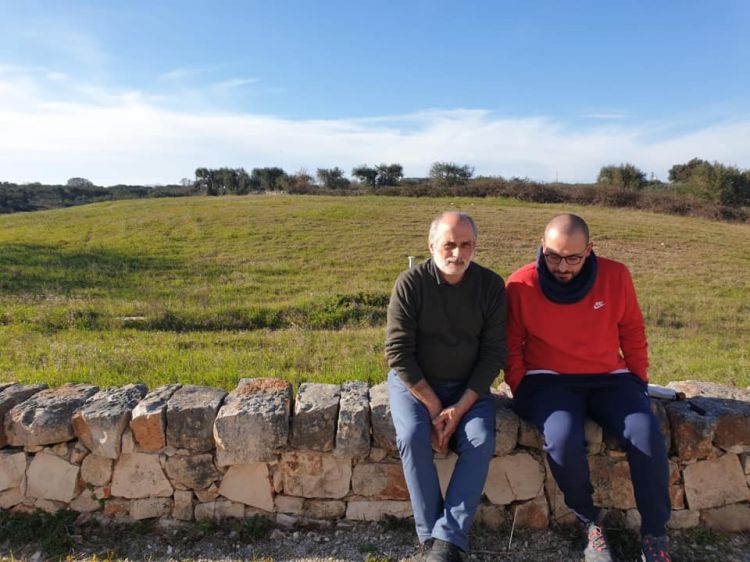
Michele Varvara with Corrado Assenza
Everything went well. People noticed the Varvaras' products. «The following day, the phone started to ring. Schingaro and the Cereas called first: they became our fist client and wanted our meat for their dishes. This led to an incredible domino effect, every week we made it to the list of suppliers of two or three top restaurants».
The project of the grill-restaurant died before being born, replaced by something even more interesting. «We stopped and asked ourselves: what shall we do? For sure we had been offered a promising alternative, which allowed us not to change anything about the job that my dad and grandfather had always done, that is to say select great meat. On top of that, we needed a new van, a new labelling system and new rules in the shop...». Not that difficult. Any doubt was definitely removed thanks to Domingo Schingaro, «he punched me, metaphorically. "Michele, come on, don't hesitate, just dive into this business". And he convinced me. I must give him credit for this». Then in June 2016, Michele and his brother Alessandro were at home, exhausted after a hard day at work: «We had looked into each other's eyes, full of doubts. A hug followed. It was at that moment that the old Varvara shop became Varvara - fratelli di carne».
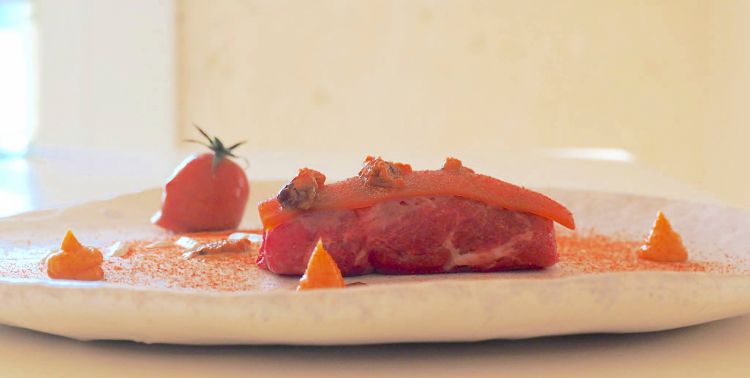
Varvara Fillet of vacca podolica, mussels and sea urchins from Domenico Schingaro
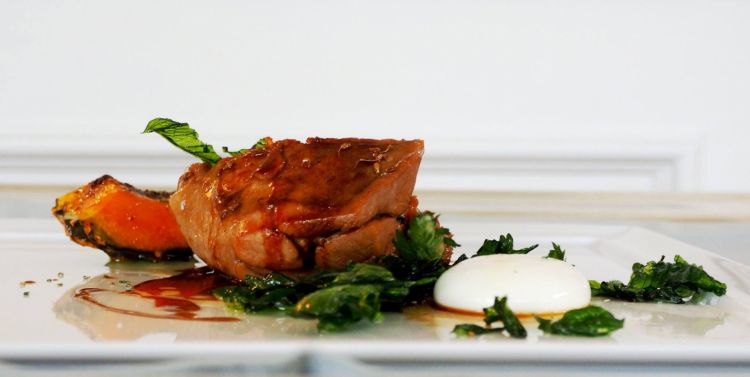
Varvara Goat on the skewer, yogurt and pumpkin with spices, from Da Vittorio
Today the butcher's in Altamura supplies Italian haute cuisine: cuts of veal when they've finished nursing, «they can no longer conceive; we buy them and have them for at least two years, following our food protocol. They're often of the podolica breed, but not always, because these are animals that must graze in the wild, and in some seasons there are not rich enough pastures». But also sheep, pigs, rabbits, hens... And the now famous lamb, «so basically a bit of everything, expect for horse meat and game, for which Basilicata is not suited». But how come the meat is so good? «Here's why. We tried to take the animals, move them from their area, and closer to where I live in Puglia, to make the work easier, as we travel for 100K km each year only to transport the cattle... Same animals, same diet, similar landscapes: in the end we noticed the result was different, worse». Why so? «Water, humidity, temperature, overall conditions that generate zero stress... Basilicata has a unique and extraordinary climate due to its geographic location: the sea to the east and west, the mountains in the north and south. This influences the undersoil, the soil, the vegetation and hence the pastures too». It's like talking of the microclimatic factors that one usually mentions when explaining the secrets in the seasoning of Prosciutto di San Daniele; but in this case they're applied to live animals.
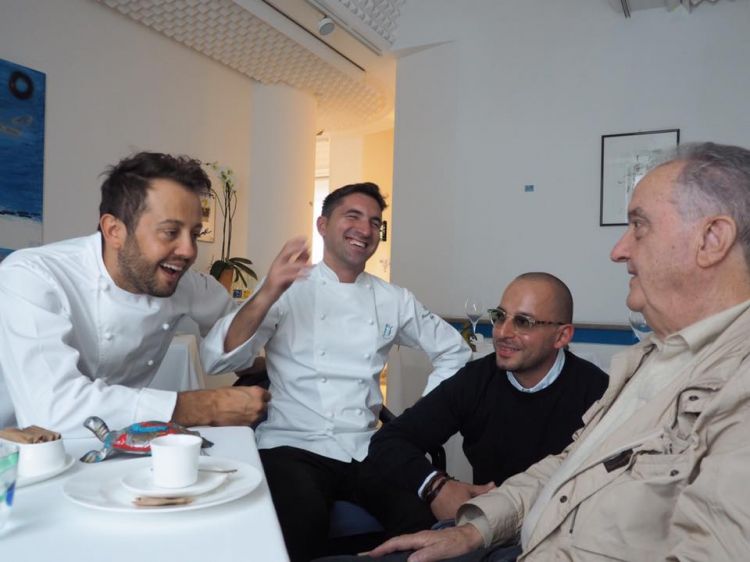
Michele Varvara with Alessandro Negrini, Fabio Pisani and Aimo Moroni
does not refer only to the
Varvara brothers, «but also to everyone else participating actively in this project», a supply chain made of 34 breeders, 90% of whom are from Basilicata, but someone also from the province of Taranto». They were brought in by
Michele, convinced by the potential of his idea, and now participating in this surprising outcome. «It's all based on an old pact of trust: I would offer to become fine dining suppliers to people whose fathers had worked like my father, whose grandfathers had worked like my grandfather». But we had to change methods and face some obstacles: «The skyrocket growth in demand from all around Italy, and the flood of calls from chefs who appreciated our meat had us unprepared. We would run to the countryside to satisfy the demand». Of course, my dad
Antonio used to do the same, but at a different speed: «He would go once a week, with a rotation we still follow». Every district of the Dolomiti lucane offers the best at a specific time in the year: there's a side where there's a season when it rains all the time, hence pastures are impossible, and the animals must stay in the barns, and aren't ready; then there's the area where it snows a lot; and the other where it's so hot in the summer the cattle must be moved elsewhere, for two months. And so on. Hence the demand to the breeders were always alternated and always in small numbers, «one would give you five lambs, the other a podolica cow», they were not ready for this leap in quality. «All of a sudden we went and said, "we longer need 5 lambs, but 25; no longer one cow, but 10". They were surprised». Not just that: «What used to "happen" from time to time, had to become systematic. First there would be the animal that was slightly leaner, or fatter, the beautiful and the not so much so... Suddenly there was no longer space for imperfection, because we were starting to work with that world. With fine dining».
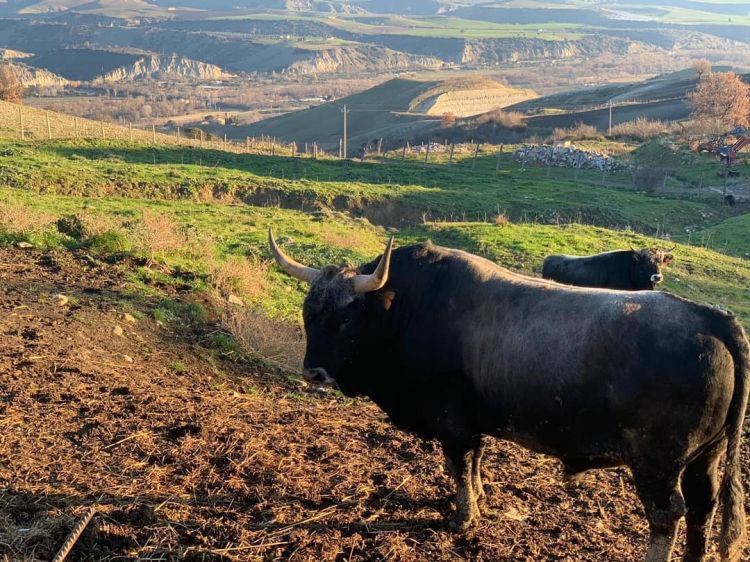
Landscapes of the Dolomiti lucane
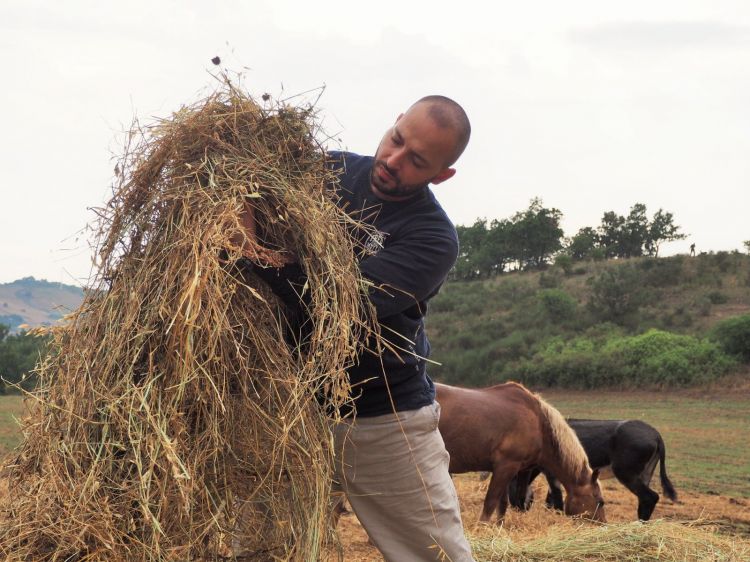
Varvara at work in the fields
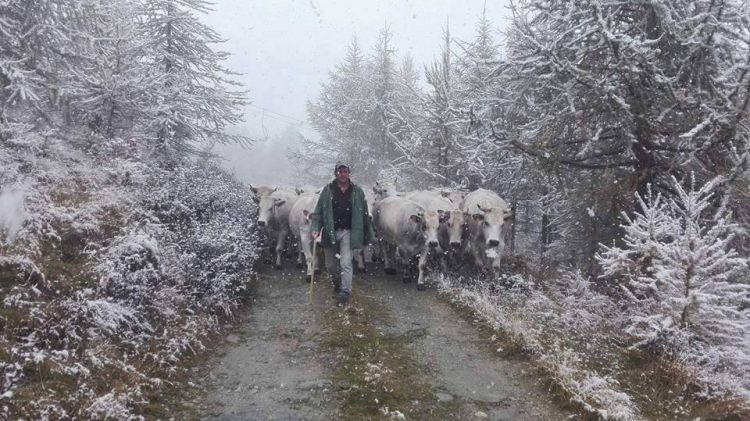
Winter breeding in Lucania
A change, however, that everyone accepted with enthusiasm. Really, all 34 suppliers. «I arrived and said: "You must produce more, and even better". They got it, they accepted and it became an extraordinary growth opportunity for all of us. The breeder who only from time to time would add spelt to the animal's diet, because it's pricey and perhaps he would sell it elsewhere, turned it into an important part of the daily diet. The growth made it possible to turn what used to be overcostly into something necessary and sustainable». Everyone agreed to follow these stricter rules: «Nobody, among our "historic" breeders was left out. Nobody left the project. They were 34 and still are as many. They've all raised the standards. We didn't want to increase the volumes too much: we currently supply 35 restaurants, given our choices it would be hard to do more». It's a "game" where everyone wins: «This turning point has given breeders more serenity. Before, they would survive. They're no longer hanging by a thread. We helped each other.
Fratelli di carne, indeed». They're happy: «Many were considering leaving, or perhaps moving to agriculture, which makes life easier. Instead, they've rolled up their sleeves, and followed us. And some have even taken an active part in this process: they see their meat in the hands of great chefs and ask me if they can contact them to explain how best to use it».
The change was not only at one end, but at the other too, that is to say it also involved the restaurants. «To give you an example, I have clients like
Enoteca Pinchiorri in Florence or
Piazza Duomo in Alba who, because of the kind of food they offer, need noble cuts, perfect, and constant, week after week. So there was a problem: if they want to have 20 ribs of lamb, what should I do with the rest?». Soon the trust that
Varvara already had with its supplier was shared by their clients: «Now many just ask for what's available each time. They even change the menu depending on what I'm able to ship. See: the menu of a premium restaurant changes based on what's available in the shop. My shop. It's incredible». A way not to fill the refrigerators pointlessly, but to honour the laws of the countryside, which pay no attention to the laws of consumption.
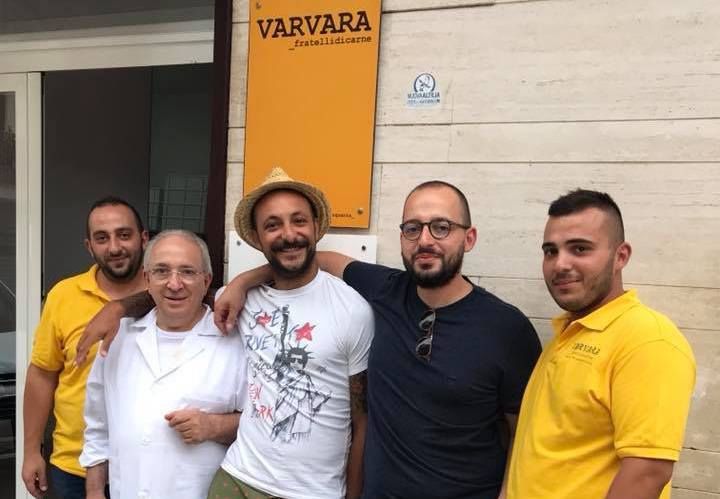
The Varvaras with Diego Rossi
With this system it was gradually possible to give value to every cut, including the
quinto quarto. «I recall when only liver had a demand, the rest ended up eaten by farm dogs. Now nothing is wasted. They even ask me for the blood, which is used as a fertiliser: we still need the necessary authorisations but we'll get there. For me this is the noblest part of the animal, an obsession». We ask
Michele Varvara who is the chef who surprised him in the use of poor cuts. «I'll be banal:
Diego Rossi. He always manages to give an interesting interpretation to everything I present. He takes new roads which his colleagues then follow.
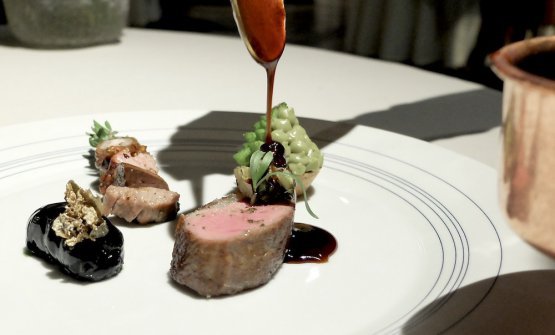
Lamb ribs with savoury, a dish from Enrico Bartolini. The lamb comes from Basilicata, and Varvara
The other obsession is France. Varvara now supplies four 3-starred restaurants in Italy (there's also Enrico Bartolini on top of the already mentioned Enoteca Pinchiorri, Da Vittorio and Piazza Duomo, «and by the way, I would like to note that Enrico Crippa taught me something very important, seeking perfection»). What's the link with France? «Crippa, but also Antonio Guida, have worked in France where they learnt to work with meat like nowhere else in the world. They both told me: your lamb is exceptional, better than those from the great maisons in France. In some they have tasted it, like at Troigros, and indeed they asked me to supply them. I sent a one-off. For now I can't do more because of logistics and authorisations, but we'll get there as well». France, and Denmark: «We arrived at Noma, again with lamb, thanks to Riccardo Canella [who recently left, see here]. It was last spring: it had a big success, René Redzepi wrote me some nice words. When there was the lockdown, they still had the entrails in the pantry: all the cooks were eager to compete to take them home».
We love Varvara's story because it's a case history on how to enhance Italian excellences by creating a network, making them available and known to the world. A model that can be replicated all across Italy so that many secluded extraordinary food excellences can stand out. Michele Varvara: «Basilicata alone has so many such realities. There are hundreds of businesses and extraordinary yet unknown products. There's lots to be done», and so is the potential.
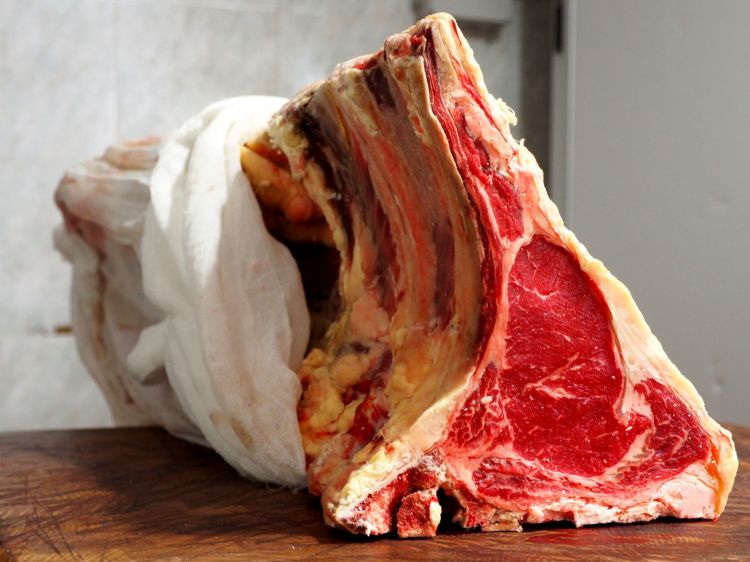
Meat and delicacies from Varvara - fratelli di carne
We end with two piece of news, one big and one practical. The first: in the future
Varvara - fratelli di carne will become a farm with their own cattle. «My idea is to wake up in the morning in the same place where I will work during the day. No more living in a car as I did in the past few years. The animals will be born and raised there, with us». Where? «We still don't know, we're researching. For sure, between Basilicata and Puglia, near Altamura. It's a delicate step, because of all those things I said earlier about microclimates. I'll make a reasoned choice, and it will be a good one, because the time I won't spend in the car will allow me to pay even greater attention to quality and to making the production lighter. I want to shorten the supply chain. At first, I will buy the cattle from my same breeders, and keep them for a while, in a transition that will take years. Then, with the new generations, hence in six- or seven-years' time, we will close the circle: we'll have our own animals». What will the farm be like? «There will be a shop and a slaughterhouse. A restaurant? I don't know, I don't think so. If anything, I'd like to say that, for instance someone like
Riccardo Camanini [that is to say one of the chefs who most recently chose
Varvara as supplier, which in fact resulted in the raw materials for the
Dish of the year at
Identità Golose 2020, see here] could find a grill where to taste my products».
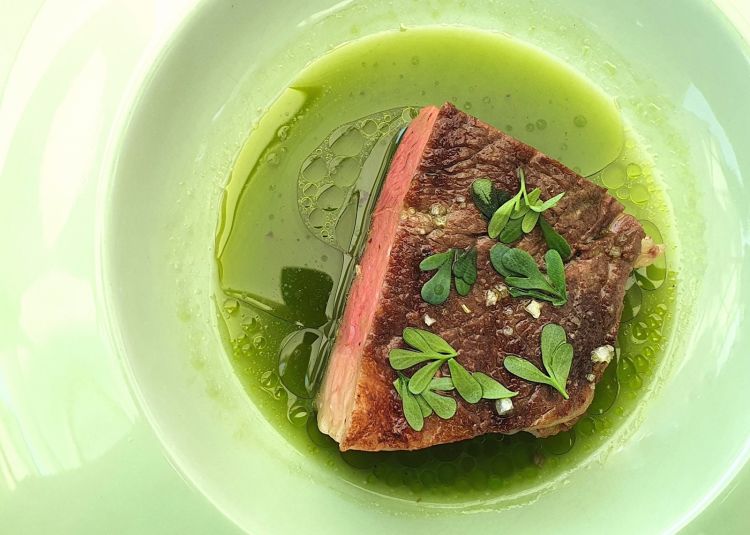
Grilled ribs in broth: the dish of the year at Identità Golose 2020 is from Riccardo Camanini. The meat is from Varvara
And then, another crazy idea, an opportunity that
Michele had in mind: «Chefs will no longer buy the butchered animals. They will come to the farm. They want ten lambs? They will pick ten while they're grazing calmly. They want that their fat tastes of camomile? I will raise them with what they prefer, with specific aromas, and for the necessary time. When it's time, I will supply them», a sort of tailor-made. It recalls
Massimo Spigaroli and his culatelli that rest in grottos, and are already sold while they are refining.
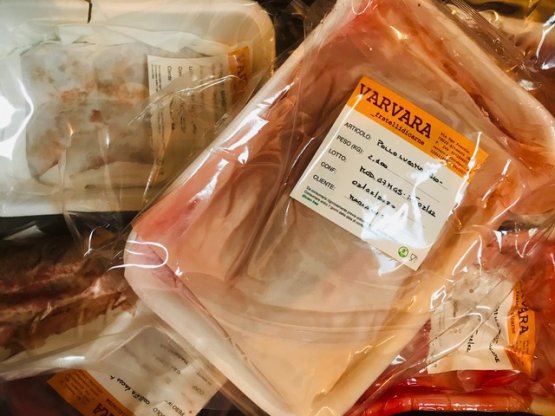
Varvara - fratelli di carne's delivery service
Finally, we promised some useful info. With restaurants paralysed by the various lockdowns, Varvara has launched a shipment service to private clients, «I make my delicacies for Signora Maria, I like to say». Fancy some meat from Varvara? If you've arrived here you know you must adapt to what's available, because this is "real" meat. There is no website («I used the money to buy a vacuum machine and a labelling one, plus a new van»): you can give a look at their Facebook page Varvara - fratelli di carne, get an idea and then call 320 4118061, or write to varvara.michele@gmail.com. They ship these marvels all over Italy.
Translated by Slawka G. Scarso